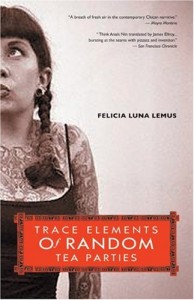 Trace Elements of Random Tea Parties
Trace Elements of Random Tea Parties
by Felicia Luna Lemus
Farrar, Straus & Giroux. 252 pages, $23.
FIRST you fall in love with the title. You imagine mismatched pieces of fragile china, translucent, in delicate greens and floral pinks. Your mind hand-feeds you memories of sweet petit fours, frosted pastel lavender and yellow, you smell jasmine tea steeping in a perfectly shaped tea pot, steam blooming from the spout like fragrant ghost petals.
Then you read Trace Elements of Random Tea Parties and realize that it has nothing to do with any of the above, but is instead a brilliantly simple, yet simply brilliant, tale of living a life split between conflicting cultures, with ingredients of young love, the quest for independence, the ties of family, heartbreak, poverty, lust, and learning thrown in. But that’s not the whole truth either. There’s a charming Alice in Wonderland-like quality to this book, beginning with the title, but also in the fact that the narrator seems to grow larger, more substantial, right before our eyes.Leticia Marisol Estrella Torrez, a twenty-something film school grad who grooms gay boys’ dogs—which allows her to spill out her femme fantasies in pink and peach puppy manicures—is valiantly building a lesbian life on her own terms, pirouetting between a lesbian identity that includes “shaved head and stomping boots, my adolescent dyke dick hard all the time” and the expectations of her terribly hard-loved Nana, who raised her to be a good Mexican-American woman. Leti, whose style is thrift shop dyke chic—all brown cotton socks and fake pearl choker—is given the most senseless but sensational lines, such as: “The static crackle jangle of my voice hummed warm reliable.” She struggles in lust and love but picks good friends, notably Nolan, who is rock solid, the kind of best friend buddy girl bro, the kind who introduces you to serious crush material to send you high, then circles round to rescue you when it all comes crashing down.
For the love in the love story, Leti meets K, who is deep, butch, and Greek, emitting the scent of Old Spice and revealing taut muscles in her boy cotton white tees. She is “candy heaven” to Leti. Their sex is sweet and almost frothy, but not in a cloying way, and the characters are able to wax ardently and earnestly about their feelings and hopes. But it’s a love story without a future tense. The women’s come-close-no-not-that-close style of courtship belies their struggle to discover how to love each other in ways that are real and sustainable. But there’s also a freedom in how they search for a way of sharing a life that’s free from the musty past, symbolized by Leti’s apple green couch. “The way my bunny K and I were with each other, with each other’s ideas, with each other’s bodies, with our bodies together, it wasn’t limited to teasing or rough or controlling like I had grown used to. I didn’t have to bottom or top or be strong or coy. It was all that and none of that and the incredible everything in between.”
Trace Elements is beautifully written, so much so that the debilitating losses take a while to hit home. When they do, it’s a dark, dark thing, but a loss that shows who is friend and who is foe, and what it means to live within a community where lovers and friends crisscross in a myriad of configurations. And it proves that the ones who matter are those who stick around when they’re needed.
Lemus has freed her prose from conventional sentence structure, letting it follow the patter of her thoughts, and has done so with a confidence that doesn’t come naturally to many writers two and three times her age. She doesn’t use words as single hits; she writes in broad strokes, and her brilliantly misplaced adjectives often allow moods and objects to feel more real, more taste-able and touchable than they would be if more plainly described. (“No question, I wanted blueberry gorgeous blue. … Doodley-do. I wanted that blue. My tongue begged to be blue slurped.”) The author deserves praise for not showing us her MFA. She must have been a tough student, having something to say about everything. This is not writing that has been workshopped into sanitized Styrofoam; this is storytelling that’s full and fleshy and uncontrolled, wherein lies its power.
________________________________________________________
Joy Parks reviews for several periodicals and writes “Sacred Ground,” a column on lesbian writing that appears on gaylinkcontent.com.





